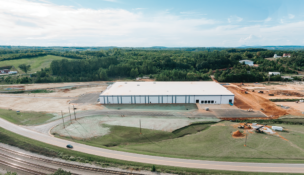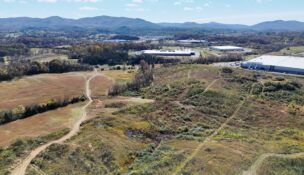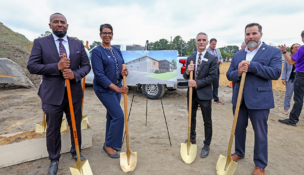A multifaceted strategy
Southwest Virginia seeks to build on small business wins
Tim Thornton //March 1, 2020//
A multifaceted strategy
Southwest Virginia seeks to build on small business wins
Tim Thornton //March 1, 2020//
Catching the big one matters, but a lot of little successes can mean a lot, too. In Southwest Virginia, small triumphs have accumulated over the past year, in addition to larger announcements.
Last April, Polycap LLC, a Toronto-based manufacturer of specialty caps and closures, announced it would invest $7.7 million in Lebanon, establishing its first U.S. facility. Paul’s Fan Co., a fan manufacturer based in Buchanan County, is expanding its operations and establishing a new operation in Lee County, it announced last November. (Read story here.)
“In terms of traditional, industrial type of announcements … Polycap and Paul’s Fan Co. were probably the two largest this year, so they’re certainly going to have an impact,” says Jonathan Belcher, executive director of the Virginia Coalfield Economic Development Authority (VCEDA).
Polycap and Paul’s Fans expect to add a total of 103 jobs, and Lawrence Brothers, a heavy metal fabricator in Bluefield, added a new laser and announced plans to hire 28 more workers.
The Sykes Wise-Intuit facility, a customer service call center for the maker of QuickBooks and TurboTax, and for the managed health care corporation Centene, added 300 workers, growing its local workforce to 937 employees.
Farther from the coalfields, Scholle IPN, which manufactures plastic bags in box containers, announced plans last March to add 42 jobs and invest $10.29 million in Smyth County.
Some new ventures seem nearer the cutting edge. Appalachian Biomass Processing, expected to open this spring in Wythe County, is the state’s first commercial hemp-processing facility. Carbon Research and Development Co., in Wise County, manufactures commercial-grade graphene, a carbon sheet 200 times stronger than steel that’s an efficient conductor of electricity. The company also has opened a Graphene Research Center in the Lonesome Pine Regional Business and Technology Park.
VCEDA is also seeing a bigger-than-expected impact from its seed capital grants, which provide up to $10,000 to startups no more than a year old with fewer than 10 full-time employees. VCEDA approved 35 grants in 2019, and the companies that received them plan to create 104 full-time jobs and 105 part-time jobs. “That’s a pretty big impact, when you add it all up,” Belcher says.
The grants program began in 2017. So far, out of the 70 companies that have received seed capital funding, only two have failed.
“I think that’s probably because we make them work pretty closely with the small business development office and really do their homework before they ever even apply,” Belcher says. “It’s a very good return investment. It’s been a much better return on investment than you would have on a lot of larger projects.”
Finding workers
The tight labor market is a common challenge for employers across the commonwealth right now, but it’s a fairly new problem for Southwest Virginia, which has been no stranger to double-digit unemployment after massive coal mining layoffs.
Wise County, for instance, had more than 17% unemployment in 1995, and it was above 10% as recently as 2013. However, the current unemployment rate across the region is between 3% and 4%, says Rachel Patton, business services director with the Southwest Virginia Workforce Development Board. “As we’ve gotten into a tighter labor market, we’re looking for those pockets of workers that we can train to help regional businesses fill those needs.”
Companies are hiring students just out of high school and people fresh out of prison, helping them adjust or readjust to the working world, Patton says.
Layoffs of miners — seen with the 2019 closures of Blackjewel LLC’s mines in Wise and Lee counties, as well as others in adjoining states — still affect the region, but today local workers have more opportunities for new jobs.
Despite the low unemployment rate, some employers, such as manufacturers paying higher salaries, seem to have no problem finding workers, in part because some residents are underemployed or have low-paying jobs, Patton notes.
Jackie Estep, sales and marketing manager for Paul’s Fan Co., says her company hasn’t had any trouble finding applicants for its new Lee County facility.
While the Southwest Virginia Workforce Development Board is focused on building the workforce that’s already in Southwest Virginia, InvestSWVA is a public-private marketing initiative that’s all about attracting investment from outside the region and transforming abandoned coal fields.
“Our plan is simple: Market the region, attract new business investment and bring the jobs of the future to Southwest Virginia,” says Will Payne, InvestSWVA’s project lead and managing partner of Coalfield Strategies, a marketing consulting firm.
With funding from sources including the Virginia Tobacco Region Revitalization Commission and Georgia-based internet provider Point Broadband, InvestSWVA is working to promote the region as a tech hub with room for data centers.
Small-to-medium employers seem to be the region’s sweet spot, Belcher says. It’s a lesson Southwest Virginia may have learned the hard way.
“I think if we could get enough quantity of those,” he says, “that kind of spreads the risk out more than if you put all your eggs in one basket with one employer that, if it went out of business or had a massive layoff or something like that, would have a devastating impact — not unlike [when] you had a major closing in the coal mine industry.”
F

















